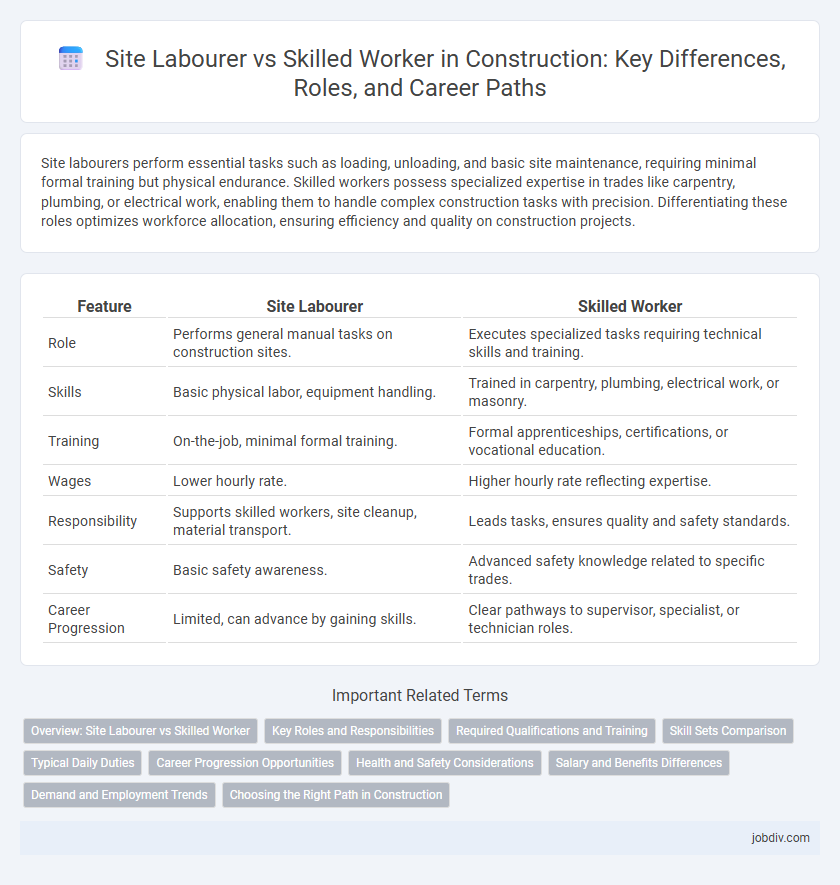Site labourers perform essential tasks such as loading, unloading, and basic site maintenance, requiring minimal formal training but physical endurance. Skilled workers possess specialized expertise in trades like carpentry, plumbing, or electrical work, enabling them to handle complex construction tasks with precision. Differentiating these roles optimizes workforce allocation, ensuring efficiency and quality on construction projects.
Table of Comparison
| Feature | Site Labourer | Skilled Worker |
|---|---|---|
| Role | Performs general manual tasks on construction sites. | Executes specialized tasks requiring technical skills and training. |
| Skills | Basic physical labor, equipment handling. | Trained in carpentry, plumbing, electrical work, or masonry. |
| Training | On-the-job, minimal formal training. | Formal apprenticeships, certifications, or vocational education. |
| Wages | Lower hourly rate. | Higher hourly rate reflecting expertise. |
| Responsibility | Supports skilled workers, site cleanup, material transport. | Leads tasks, ensures quality and safety standards. |
| Safety | Basic safety awareness. | Advanced safety knowledge related to specific trades. |
| Career Progression | Limited, can advance by gaining skills. | Clear pathways to supervisor, specialist, or technician roles. |
Overview: Site Labourer vs Skilled Worker
Site labourers perform general tasks such as material handling, ground preparation, and basic site maintenance, requiring minimal formal training but strong physical stamina. Skilled workers possess specialized expertise in trades like carpentry, plumbing, or electrical work, demanding formal certification and extensive hands-on experience. The distinction affects wage levels, job responsibilities, and safety requirements on construction sites.
Key Roles and Responsibilities
Site labourers perform essential manual tasks such as site clearance, material handling, and assisting skilled tradespeople, ensuring smooth daily operations on construction sites. Skilled workers possess specialized expertise in trades like carpentry, plumbing, or electrical installations, responsible for executing complex construction activities with precision. Both roles are integral to project success, with site labourers supporting foundational site preparation and skilled workers delivering technical craftsmanship.
Required Qualifications and Training
Site labourers typically require minimal formal qualifications, often needing only basic safety training and on-the-job experience, making them suitable for general manual tasks. Skilled workers must possess specialized certifications, such as trade-specific licenses or apprenticeships, ensuring expertise in areas like carpentry, plumbing, or electrical work. Comprehensive safety training and continuous professional development are essential for skilled workers to comply with industry regulations and maintain high performance standards.
Skill Sets Comparison
Site labourers perform essential manual tasks such as digging, material transportation, and site cleaning, requiring basic physical strength and reliability. Skilled workers possess specialized expertise in trades like carpentry, electrical work, or plumbing, demanding advanced technical knowledge, precision, and certification. The skill set comparison highlights that skilled workers contribute with expertise and problem-solving abilities, while site labourers provide foundational support and physical labor crucial for project progression.
Typical Daily Duties
Site labourers perform essential physical tasks including loading and unloading materials, site cleaning, and assisting skilled workers with basic operations. Skilled workers execute specialized duties such as operating machinery, reading blueprints, and performing technical construction tasks like carpentry, plumbing, or electrical work. The division of daily responsibilities ensures efficiency, with labourers supporting the groundwork while skilled workers focus on precision and specialized construction activities.
Career Progression Opportunities
Site labourers typically start with manual tasks and gain foundational experience, enabling them to progress into skilled worker roles through vocational training and apprenticeships. Skilled workers possess specialized expertise in trades such as carpentry, plumbing, or electrical work, which opens opportunities for supervisory positions, project management, or technical certifications. Career progression in construction emphasizes continuous skill development, with skilled workers often earning higher wages and greater job security compared to site labourers.
Health and Safety Considerations
Site labourers face higher risks of injury due to general tasks like manual handling and exposure to hazardous materials, requiring strict adherence to PPE and safety protocols. Skilled workers operate specialized equipment and perform technical tasks that demand comprehensive training and certification to mitigate risks of machinery accidents and ergonomic strain. Both roles necessitate ongoing health and safety training to ensure compliance with OSHA standards and reduce workplace incidents.
Salary and Benefits Differences
Site labourers typically earn a lower wage compared to skilled workers due to the difference in required training and expertise, with average salaries ranging from $25,000 to $35,000 annually versus $40,000 to $60,000 for skilled trades such as electricians or plumbers. Skilled workers often receive enhanced benefits, including health insurance, retirement plans, and paid apprenticeships, reflecting their specialized skills and higher responsibilities on construction sites. Wage growth potential is significantly greater for skilled workers, supported by union representation and ongoing certification opportunities that further increase their earning capacity and job security.
Demand and Employment Trends
The demand for site labourers in construction remains steady due to ongoing infrastructure projects and the need for general manual tasks, offering entry-level employment opportunities with moderate wages. Skilled workers, including electricians, plumbers, and carpenters, experience higher demand driven by complex building requirements and specialized expertise, leading to better job security and increased salary prospects. Employment trends indicate a growing preference for skilled labour as technology integration and regulatory standards in construction projects become more stringent.
Choosing the Right Path in Construction
Choosing the right path in construction depends on individual skills and career goals. Site labourers handle general tasks such as loading materials and site preparation, requiring minimal experience but offering entry-level opportunities. Skilled workers possess specialized training in trades like carpentry, plumbing, or electrical work, enabling higher wages and greater job stability in projects demanding technical expertise.
Site Labourer vs Skilled Worker Infographic

 jobdiv.com
jobdiv.com